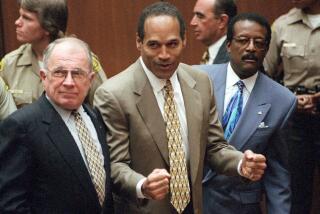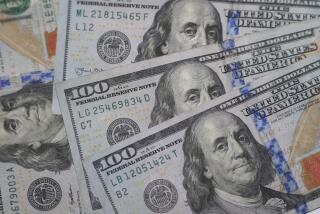Hilton’s Lawyer, Son Clash Over Hotelier’s Intent
The lawyer who drew up a succession of wills for the late Conrad Hilton over several decades testified Tuesday that the “prime objectives” of the hotel chain founder were not to leave “unearned wealth” to family members and to give his assets all to charity.
After the testimony of 80-year-old James Bates, a markedly different view of Conrad Hilton’s priorities was given in the same trial in Los Angeles County Superior Court by Hilton’s son Barron, who testified:
“My father’s first interest was his hotels. His second interest was charity.”
Barron, 58, who is chairman, president and chief executive of Hilton Hotels Corp., claims a right under the will to buy a controlling 27.4% stake in the hotel chain from his father’s estate at stock prices that prevailed when he died seven years ago. The market value on the estate’s interest has increased to nearly $500 million from about $140 million in the interim.
Hilton Feared ‘Destructive Power’
Bates, under doctor’s orders to testify only two hours a day, spoke vigorously in discussing Conrad Hilton’s intentions in his wills, including the final one.
Under questioning by Andrew Garb, an attorney for the Conrad N. Hilton Foundation, Bates said Hilton formed the charitable foundation because he wanted his children to “go out . . . and earn their own living” and was apprehensive of the “destructive effect of unearned wealth” on persons. Under the will, the bulk of Conrad Hilton’s estate is left to the foundation, but the 27.4% interest in Hilton Hotels has not yet been distributed.
Barron Hilton later testified “My father was a philanthropist but also a businessman. He didn’t want to see his company taken over by an unfriendly group. That’s the primary consideration of his will.”
In the trial before Judge Robert I. Weil, the foundation is seeking to be upheld in its rights to receive all the Hilton Hotels stock held by the estate.
It has reformed itself into a “public support group” approved by the Internal Revenue Service. The step was a means of avoiding having to sell all or part of its hotel stock as “excess business holdings” under a 1969 federal tax law. If it were forced to sell any of those shares, the will gives Barron Hilton the option to buy them.
Barron Hilton conceded in court Tuesday that if he had to pay cash at today’s market prices for the hotel stock, he could not do it with his entire net worth of about $85 million.
He said he would have to recruit a group of fellow investors who would be entitled to as much as two-thirds of the stock.
Conrad Hilton’s will gave his executor discretionary right to take a promissory note from Barron for any stock he bought. However, Myron Harpole, attorney for Bates, told Barron Hilton in court that “as far as (Bates) is concerned,” it could only be a cash deal.
Barron Hilton was questioned closely about voluntarily suspending his role as co-executor of the Conrad Hilton estate in April, 1983, at the insistence of Bates.
Garb sought in a series of questions to get Hilton to say whether he considered that he would have a conflict of interest by remaining as co-executor while pressing his claim for a right to exercise an option for the hotel stock from the estate he represented. Hilton declined to give an unqualified yes or no. He said he still believes that Bates has the “obligation” to follow Conrad Hilton’s “intent” to let him buy stock with a promissory note.
Hilton, under questioning by one of his own attorneys, Wayne Smith, said Bates did not inform him in April, 1983, that he intended to “thwart” his stock option.
More to Read
Inside the business of entertainment
The Wide Shot brings you news, analysis and insights on everything from streaming wars to production — and what it all means for the future.
You may occasionally receive promotional content from the Los Angeles Times.










